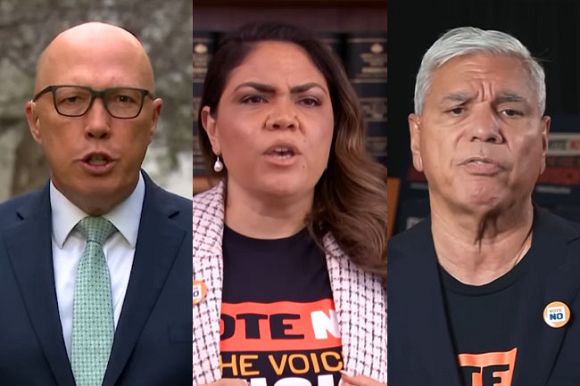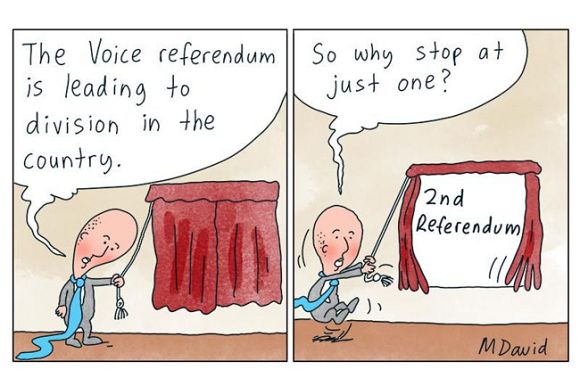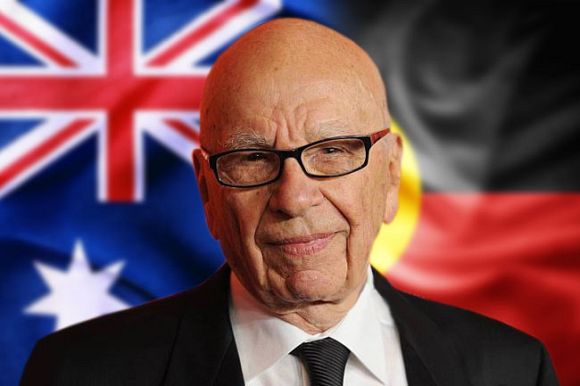With the drive for a consensus on the Voice to Parliament causing anger on the Right wing, Dr Lee Duffield inquires if it is old-style racism come back to spoil the day.
WHEN THEY MADE the Recognition of Elders speech at a recent regional opera performance just outside of Brisbane, an old bloke, White coloured, got up in the stalls and called out: “And I recognise also all the other elders!” The musicians drowned him out, rushing into an overture.
A friend who was present noted that the audience, which included a high representation of retirees, gave some strong applause and that her two grandchildren, young adults, were shocked and disgusted.
Great expectations and anger
After most of an adult lifetime expecting change in race relations and advancement for the Indigenous community, it is still proving to be hard going. The prospect of recognition in the Constitution, a Voice to Parliament, then a treaty and reconciliation, all proposed by the gathering at Uluru, looked like it might be a circuit breaker — it might bring positive change at last.
It might follow through on the famous 1967 Referendum that recognised Indigenous rights in the Census — “Yes” by 90 per cent. One could get out and support it as a drive for consensus, not a political campaign; more a question of righting wrongs and not points for discussion.
But hopes and expectations can be dashed, if hardly a surprise. In the background, we had decades of endemic conservatism holding back any social reforms and a bitter streak of racial prejudice in the community. Here it seemed to be suddenly flaring up again, against the Voice.
So it would seem from the staged incredulity, or sarcasm of the untidy woman serving at the coffee shop, reluctantly agreeing to let me pin up a flyer for an address by a prominent Black academic: “You want the ‘Yes’ vote!?”
So it would seem from the mother of a young family overtaking me in their Camry, in Brisbane’s Redland Bay. She had the window down and yelled at me. Was it my driving? No, still awake, still on course, obeying the speed limit. The Cowboys NRL sticker on the bumper bar? No, the northern team would not inspire hate like that anywhere in Queensland. Probably, then, the “Yes” sticker on the bumper.
There was also the man who emailed me his view:
‘I am as opposed to this as anyone can be. When I see lobbying like this it makes me very angry because I have very good reasons to say we should NOT VOTE FOR THE SO-CALLED VOICE GARBAGE [His emphasis].’
So there is plenty of “No” to be encountered. A lot of it may be the usual confusion and disinterest that leads to a passive “No” in referendums, but there is the anger as well, raising a question: Where does “No” really come from?
Dishonesty?
The “No” campaign has talking points, side arguments and distractions, but does not explain its motives and ideology, let alone the passion. It is even reported that operatives of the campaign are telling supporters to concentrate on fears and doubt about the vote, not to worry about facts. That won’t really explain it.
Even a bit of intellectual dishonesty will do, for example: “I can’t vote for this because nobody has told me what it is about” (or “I’m too slow to look up the website, watch the news or ask somebody about it”). Still won’t explain it.
In the opera scene, we had the phenomenon of relatively privileged people acting hurt and savage if somebody who is usually less privileged gets a break — some special status. And there is the shock of the unaccustomed, seeing Indigenous leaders at many levels prominent in mass media, making their own case. It is not like 1967 when Indigenous people were in a much weaker, therefore “unthreatening” position.
As it goes: “Some of them are that arrogant and demand everything spent on them.”
That might explain a good bit, but not all.
What’s behind it?
The announcement of the Referendum date as 14 October saw Prime Minister Anthony Albanese, in Adelaide on 30 August, talking up the original plan: try and build consensus around recognising the unique position of First Nations in history and formalise their consultations with government at the highest levels.
But that event had already been turned into the start of a political campaign, not a consensus one, by conservative parties deciding to support “No” and stirring up activists at the two extremes, Black and White.
Left activists wanted Black “sovereignty”. It’d be hard to get very far with that, except material for lifetimes of protest, embitterment and attention.
Right activists, headed by Senator Jacinta Nampijinpa Price from the National Party and Warren Mundine from the Liberals, launched their campaign in Hobart while Albanese was speaking in Adelaide.
Their appearance was organised by the radical Right-wing organisation, the Centre for Independent Studies, which unaccountably has been given its own time slot for broadcasts on ABC radio.
Originally an American-influenced neoliberal think tank, in recent times it has been promoting the tough-line-on-China lobby, and now the Voice “No” vote. Mundine has been describing himself on air as its consultant on the issue; Price is billed as its ‘former Director of Indigenous Research’.
The broadcasts on both counts provide a facsimile of ABC protocols that demand a ration of alternative views. We hear some, while a playback of episodes shows what has been going on. Invited guests from the News Corp stable include Voice opponents Paul Kelly and Peta Credlin, who ran through the set talking points.
Seeds of doubt
The Indigenous couple in question have made successful individual accommodations with the system and seem to think it should work alright for everybody. Price has asserted a leading role as the Federal Opposition spokesperson on Indigenous affairs, developing into a potential loose cannon outside of normal party discipline — something to watch.
Price publicly discounted an idea floated by the Opposition Leader, Peter Dutton, on 3 September, for a different referendum restricted to a constitutional declaration on recognition — four days after he came up with it.
Presumably, there is no harm done to their common cause by that; just a little more helpful confusion, seeds of doubt in voters’ minds, grist for the mill.
The talking points – saying we should vote “No” because we’re stupid, scared, distrustful or can’t see what it’s for – don’t tell us why they want to push against the historic reform contained in the Referendum question.
It says:
‘A Proposed Law: to alter the Constitution to recognise the First Peoples of Australia by establishing an Aboriginal and Torres Strait Islander Voice. Do you approve this proposed alteration?’
Politics of race
To leave the Left-Right Indigenous “No” campaigners aside, consider how strong an influence active racial prejudice may be in the background to all this controversy.
Traditional theory about it holds that a core of intractables see race as the prime identifier of persons, as against the “mildly racist” who might discriminate against others until they know better, while meantime habitually recognising other things: individual personality, class and opportunity, professional or craft identity, practice of faith and morals.
Intractables, at the core, where they happen to be White, cannot quite see all that: Asians and “Blacks” are the source of all trouble and should get put down.
More recently, we have the sub-theory of “nice racism” around the theme of “critical race theory”, pitched against structurally “privileged” White people. You can have a race-based disposition and still be good. The idea was powerfully formulated by American writers, especially lawyers, struggling over race relations in the USA and justice for women. The ideological thrust is most often against White men, though they may give a blast also to “White feminism”, as in “the White girl must have whatever she wants”.
As one columnist wanted to know: What’s “racist”? How much is racial prejudice deciding things, one way or the other in the Referendum in Australia?
Postscript: Jacinta Price, or those managing her, have insulted me with a paid text on 13 September, on the theme of idiot voting — “Don't know? Vote ‘No’”.
It says:
‘Hi, it's Jacinta Price. The Referendum is on 14 Oct. This Voice is risky, unknown and divisive. Don't know? Say no.’
Among his vast journalistic experience, Dr Lee Duffield has served as ABC's European correspondent. He is also an esteemed academic. He is a member of the Editorial Advisory Board of Pacific Journalism Review.
Related Articles
- CARTOONS: We promise, it's only one page
- John Farnham — The Voice of change
- Voice Referendum debate a breeding ground for conspiracy theories
- Peter Dutton needs another referendum to find his Voice
- Mainstream media helping to spread Voice 'No' campaign lies
 This work is licensed under a Creative Commons Attribution-NonCommercial-NoDerivs 3.0 Australia License
This work is licensed under a Creative Commons Attribution-NonCommercial-NoDerivs 3.0 Australia License
Support independent journalism Subscribe to IA.
















